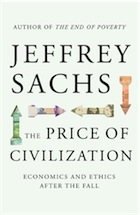Jeffrey Sacks made a guest appearance on the Charlie Rose show last night discussing his new book, The Price of Civilization: Reawakening American Virtue and Prosperity. He makes some very important points. The federal government in the United States spends about 15 percent of GDP and other governments spend about 10 percent of GDP; other developed countries devote much more of GDP to government services.
The United States federal government allocates most of the federal budget to entitlements (social security, medicare and medicaid), military spending and payment of interest on the national debt. There is only about three percent left over for discretionary federal spending -- infrastructure, energy, education, basic research, etc. Since other countries spend much more on these areas they are growing ahead of us in competitiveness in high value industries.
It is not that Sacks is unaware of the Great Recession created by the financial crisis that followed the collapse of the housing bubble, nor I am sure of the threats to the world economy that would come from a default somewhere of sovereign debt and contagion. Rather, he focuses on the longer term crisis that is undermining American society as well as the economy. He suggests that the rich have been getting richer, using their wealth to buy political power, using that power to avoid taxes that would fund legitimate government functions and using that power to promote policies and programs that will make them ever richer, while the rest of the country fails to progress and far to many regress economically. Polls show that Americans overwhelmingly want a newer, fairer deal, and the politicians (led by the Republicans) ignore the polls, cut taxes for the rich and let the country suffer. Not surprisingly the Tea Party on the right and the Wall Street protesters on the left are expressing their anger.
I am not sure I agree with Sacks' policy prescriptions. I do agree that Obama and the Democrats are not as bad as the Republicans and any of the presidential candidates they are considering. Obama is facing the problem that he can not do anything unless he can remain in office, and he can not remain in office unless he accommodates enough of the political factions to provide enough support to stay in office. Sacks seems to feel that by doing so, Obama will be unable to solve the real, long term problems that Sacks feels are most important. I tend to agree, but I don't see a better option than keeping power and doing as much as possible.
Read the review of the book in The Guardian.


No comments:
Post a Comment